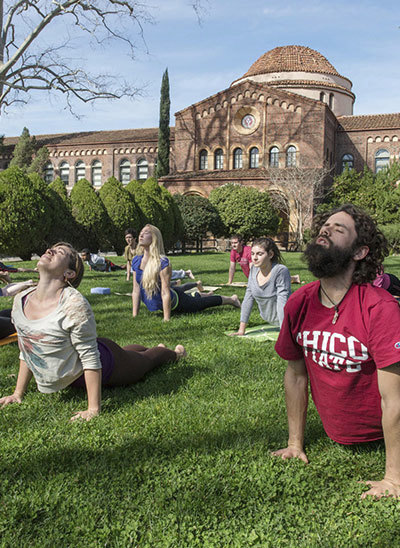Kinesiology Program on Instagram
BE:WEL Program
Beyond Exercise: Wellness Enhancement for Life
Mission
The mission of the BE:WEL Program is to provide an opportunity for individuals with disabilities to take personal responsibility for their well being in an accessible supportive environment.
Overview
BE:WEL is designed to provide an accessible facility for health promotion as well as provide individualized support for adults with disabilities within the community. The program also facilitates personal goal development with a positive sense of well being through exercise. The environment is specifically designed for participant interaction and support, provides access to ongoing personal wellness education, and provides hands-on learning opportunities for university students.
Curriculum
| Course Title | Units | Term |
|---|---|---|
| KINE 197 Adapted Physical Activity | 1.0 | FS |
This course provides individualized activity programs for adults with disabilities. Individuals participate in weight training, stretching and relaxation, lap swimming, water jogging, or walking programs to meet their personal wellness goals. Programs are designed to meet individual physical and motivational needs. In addition, students who become injured and cannot complete an activity class may enter to complete their hours for credit through an individualized program. 2 hours activity. You may take this course more than once for a maximum of 6.0 units.
Dealing with Stress & Wellness
Definitions of Stress
- Stressor is any demand on mind or body. The only way to be without stressors is to be dead.
- Stress is arousal of mind and body in response to demands made upon it.
- Positive stress/Eustress is arousal that contributes to health, satisfaction, and productivity, such as long term goals, zest for life, problem solving.
- Distress is too great or too little arousal which is harmful to body or mind. This is why finding balance in life is very important.
Elements of Wellness
- Wellness is a continually evolving process in which an individual actively strives to become more healthy physically, mentally, emotionally and spiritually. Wellness is holistic in nature and emphasizes personal responsibility. It is a response to not just “good health”, but to personal growth as well.
- Relaxation is progressive, involving visual imagery, meditation, yoga, etc.
- Exercise helps keep the body in balance. Don't go home from work, sit down and put something into your mouth. Get moving!
- Good nutrition is essential to wellness. A well balanced diet includes many fruits and vegetables, no smoking, low alcohol consumption, and a diet low in fat.
- Do you have a social network of support that you feel safe and comfortable with?
- Do you laugh and find humor in daily life?
- Do you have fun? Not just after work or on the weekends, but every day in all the things you do, at some point?
- Be optimistic. See difficulties as challenges rather than threats. Try to problem solve rather than feel stuck. Have a positive mental attitude in reaction to distress.
Helpful Hints on Wellness
You can participate in environmental wellness by:
- riding your bike to school or work
- eating less animal protein and more fruits, vegetables and grains
- wearing a bicycle helmet and using a bicycle light
- recycle glass, plastic, and paper
You can incorporate social wellness by:
- joining a club or organization that suits your interest
- getting out of the house more often with others and enjoying the outside environment
- sharing your feelings with others
- letting someone know you care by calling or giving a hug
You can enhance your physical wellness by:
- increasing your cardiovascular endurance by including aerobic exercise at least 3 times a week
- going out dancing more often or take a dance class (ballroom dancing is back!)
- wearing your seatbelt and never driving under the influence of drugs or alcohol
- including self-care into your life by learning to recognize signs and symptoms that your body gives
- practicing safe sex
Your intellectual wellness can be enhanced by:
- taking a class outside of your major
- discovering a deeper understanding of your cultural heritage
- continue your ongoing learning by subscribing to a journal or a national newspaper to stimulate thinking
- attending museums and learning to appreciate the fine arts
Enjoy your spiritual wellness by:
- discovering your inner strengths during good times and bad
- choosing to rethink your own values and apply them to your life
- developing a sense of meaning and purpose in life
- practicing meditation and trying to center, balance and quiet your mind on a regular basis
You can increase emotional wellness by:
- spending time with friends and family discussing important personal concerns and being supportive of each other
- participating in a self-esteem workshop or group
- reading a self-help book that is of interest to you
- learning time management skills and other stress management techniques
- smiling at least 20 times a day
- remembering to take a deep breath when you're under stress

